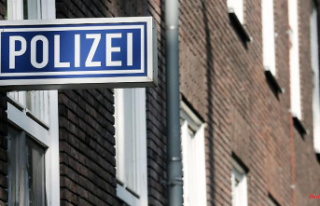Bringing fast Internet to the last milk can is not profitable for the big providers. That is why the federal and state governments are funding broadband expansion with billions. But the opposition is going too slowly. And not only that.
Schwerin (dpa/mv) - In Mecklenburg-Western Pomerania, other regions can benefit from federal grants when improving the Internet connection. As the interior minister responsible for digitization Christian level (SPD) announced on Monday in Schwerin, the broadband expansion is now also being promoted in rural areas where data transmission rates of up to 100 megabits per second are already guaranteed. Previously, there was an upper limit of 30 megabits per second. However, such a minimum supply is no longer sufficient to meet the demands of fast and modern Internet, Level explained.
According to him, the districts of Western Pomerania-Rügen and Northwest Mecklenburg have already submitted applications for faster internet in the so-called “grey spots” to the federal government, and they are in preparation in other districts. Mecklenburg-Western Pomerania had already received 1.34 billion euros from the federal government to improve the situation in the "white spots" with extremely slow internet. According to the source, the state is contributing a further 727 million euros.
Even though fiber optic cables have already been laid in many places with the help of the funding programs, the pace of expansion - also due to the corona pandemic and a lack of construction capacity - lagged behind the wishes of many users. According toleves, companies were commissioned with the implementation for 98 of the 129 project areas approved for the subsidized expansion. In 32 of these areas, route construction has been completed and some internet services can already be booked there.
As the minister also announced, around 18,000 kilometers of fiber optic cable have been laid nationwide as part of the subsidized broadband expansion. About 70,000 connections have been completed, including connections for more than 1,800 companies and around 200 institutions such as schools and hospitals. In his own words,pegel assumes that the digital "white spots" in the country will be erased by 2026. The economy has been pushing for a faster pace for a long time.
The opposition FDP renewed its accusation that broadband expansion in the north-east had been more than sluggish in recent years. "Since 2016, MinisterLevel has been advertising with the federal funds raised, but unfortunately the results still look sobering. One can only hope that the federal government's new gigabit strategy can now pick up more speed," said the FDP member of parliament David Wulff. One aim of the strategy recently adopted by the federal government is to remove bureaucratic hurdles.
As can be seen from the current federal broadband atlas, around 81.5 percent of all households in the north-east had fast internet connections of at least 50 megabits per second in mid-2021. In Saxony-Anhalt, the penultimate federal state, it was 90.2 percent, the national average being 95.1 percent. However, the laying of fiber optic cables in the northeast is having an effect. According to the broadband atlas, 53.3 percent of users in Mecklenburg-Western Pomerania now have connections with capacities of at least 1000 megabits per second. That is more than all other eastern German states - but still below the national average.












